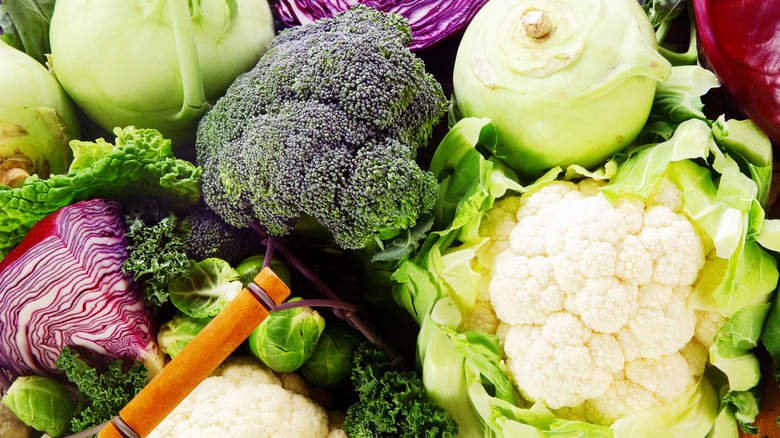6 Foods To Eat And 6 To Avoid When You Have Hyperthyroidism
Hyperthyroidism is a condition which occurs when you have an impaired function of your thyroid gland, making it produce too much of the thyroid hormone thyroxine (T4). The condition is also known as an overactive thyroid, and it can cause issues with your metabolism, weight, digestive system, and more (via the Mayo Clinic).
It can be caused by a myriad of conditions, some of the most common being Graves' disease, Plummer's disease and thyroiditis. According to the American Thyroid Association, Graves' disease is an autoimmune disease which leads to hyperthyroidism, as the body starts creating antibodies that cause the thyroid cells to increase their workload and stimulate the production of more thyroid hormones than your body needs. Meanwhile, Plummer's disease, also known as toxic multi-nodular goiter, makes your thyroid grow in size and increase its activity (via StatPearls Publishing). Lastly, thyroiditis is a general term for the inflammation of the thyroid which can lead to both hypothyroidism and hyperthyroidism (via the American Thyroid Association).
Symptoms of hyperthyroidism
Hyperthyroidism has a lot of symptoms that can be connected to a variety of other diseases. According to the Cleveland Clinic, some of the most common symptoms include weight loss, rapid heartbeat, feeling jittery and nervous, digestion issues and diarrhea, thinning of the skin, insomnia, excessive sweating, swelling and enlargement of your neck area (goiter), issues with the menstrual cycle, changes in vision, hair loss, muscle weakness, and even bulging of the eyes (which is often observed in Graves' disease).
Since many of these symptoms may point to other conditions as well, it's important to get a proper diagnosis to determine if you're really dealing with hyperthyroidism. The Mayo Clinic states there are two main things your doctor will look for: your medical history and physical assessment, and a blood test that measures the levels of your T4 and thyroid stimulating hormone (TSH). High levels of T4 alongside low levels (or no presence) of TSH indicate hyperthyroidism.
Hyperthyroidism vs. hypothyroidism
Your thyroid function can be impaired in the opposite way as well, causing it to underproduce the amount of thyroid hormones needed by the body. This condition is known as hypothyroidism, and it comes with its own set of symptoms and challenges (via the American Thyroid Association). It's usually caused by an autoimmune condition called Hashimoto's thyroiditis, a surgical removal of the thyroid gland, treatment with radioactive iodine, or just general, chronic thyroiditis. It can also be hereditary (per the Cleveland Clinic).
Even though they are both conditions that involve your thyroid gland not working properly, hypothyroidism and hyperthyroidism have different indicators and effects. Symptoms of hypothyroidism may also be linked to a variety of conditions unless properly diagnosed. The most common of these symptoms include weight gain, a slowed-down metabolism, insomnia and other sleep issues, constipation, numbness and tingling in the hands, fatigue, dry skin and eyes, reduced libido, and brain fog.
Eat: Low-iodine foods
Iodine is a trace mineral that plays a large role in the health of your thyroid. According to the American Thyroid Association, it's one of the essential parts of both T4 and T3 hormones. In the case of iodine deficiency, it can lead to thyroid enlargement and goiter. That's why one of the first treatment options almost always involves radioactive iodine. Thus, in order to prepare for it and make it effective, one must keep a low-iodine diet (via the Cleveland Clinic).
Low-iodine foods are excellent additions to your diet if you're struggling with hyperthyroidism, especially if you're planning to receive radioactive iodine for your treatment (via Medical News Today). Some examples of low-iodine foods are fruits and vegetables, unsalted nuts and seeds, unsalted nut butter, olive oil, egg whites, most kinds of meat, herbs and spices, tea, black coffee, bread,pasta, sugar, and non-iodized salts. The list of foods that aren't rich in this trace mineral is quite long, so there are plenty of options to choose from. Still, even though they're on the list, it's best to avoid foods with high amounts of sugar, as it can contribute to inflammation, potentially making your symptoms worse (via Harvard Health Publishing).
Avoid: High-iodine foods
On the other hand, you should do your best to avoid foods that are high in iodine if you're diagnosed with hyperthyroidism.
According to the Harvard T.H. Chan School of Public Health, foods that naturally contain high levels of iodine include seaweed, fish, seafood, eggs, dairy, beef liver, iodized salts, and foods fortified with iodine (such as baby formula and some wheat flours). Many animal products – especially those that come from the sea — contain iodine, so it's important to limit your consumption of them, especially if you're getting radioactive iodine treatment.
As the American Thyroid Association explains, iodized salts became popular during the early part of the 20th century as a result of the "goiter belt" (when goiter due to severe iodine deficiency became common in the Great Lakes, Appalachian, and Northwestern U.S. regions, as well as in most of Canada). Since the introduction of iodized salts, incidences of goiter in the aforementioned areas were drastically reduced. Still, about 30% of the global population remains at risk of iodine deficiency, due to inadequate iodine in their diets.
Eat: Foods rich in iron
Iron is a mineral that has quite a few significant roles in the body. For example, as MedlinePlus explains, iron has a hand in carrying oxygen from the lungs to all other cells in the body. It's also a major factor in proper thyroid function. Iron deficiency has been linked to changes in both resting metabolic rate (via an article in Human Kinetics Journal) and hyperthyroidism symptoms (per an article in the Journal of the Formosan Medical Association). Thus, consuming more foods that are rich in iron could be beneficial for people with hyperthyroidism.
Foods with high levels of iron include beans and legumes, oysters, tofu, chickpeas, cashews, tomatoes, potatoes, rice, spinach, and most meats (via the NIH Office of Dietary Supplements). There are also plenty of iron-fortified foods such as cereal, bread, and pasta. Remember, though, that you should be sticking to a low-iodine diet as well, so you might want to avoid fish and seafood.
Avoid: Gluten-containing foods
Gluten is a protein found in wheat, rye, barley, and brewer's yeast, as well as certain kinds of oats (via the Celiac Disease Foundation). Some foods may also contain gluten because of their ingredients, such as soy sauce, a variety of dressings, canned soups, marinades, and spice rubs.
Some people are highly sensitive to gluten. There are also people who are gluten intolerant due to celiac disease, an autoimmune condition (via the National Institute of Diabetes and Digestive and Kidney Diseases). Celiac disease can cause damage to the small intestine if gluten is ingested, and may even lead to worse complications down the road. Additionally, research suggests that there may be a connection between celiac disease and hyperthyroidism (via a paper in Endocrine and Metabolic Science). Thus, it might be in the best interest of someone with an overactive thyroid to stick to a gluten-free diet and avoid the abovementioned foods that contain gluten.
Eat: Cruciferous vegetables
Cruciferous vegetables include broccoli and broccoli rabe, turnips, collard greens, Brussels sprouts, cauliflower, horseradish, bok choy, cabbage, rutabaga, kale, and arugula (via the National Cancer Institute). These vegetables are known for their antioxidant properties and the positive effect they have on cardiovascular health, per a paper in Food Chemistry. Research published in Nutrition Reviews also suggests that they play a role in decreasing thyroid hormone production and even reducing iodine uptake, making them a good choice for people with hyperthyroidism.
However, vegetables from this family are also known to cause digestion issues, bloating, and increased gas production, due to a sugar called raffinose that ferments in your gut (via Time Magazine). This can have potentially harmful effects on people with certain digestive conditions such as irritable bowel syndrome (via an article in the World Journal of Gastroenterology).
That said, if you don't have a specific digestive disease, remember that steaming cruciferous vegetables makes it easier to digest them (and thus prevent you from feeling bloated). "Cooking any vegetable softens the fiber and shrinks the portion as some of the water cooks out, so it takes up less space in the GI tract," says registered dietitian and Health contributing nutrition editor Cynthia Sass (per Time Magazine).
Avoid: Soy
According to the experts at the Harvard T.H. Chan School of Public Health, soy tends to be a divisive food in terms of its benefits and impact on the body (like for instance, its potential effects on estrogen and estrogen production). Part of this is because there are numerous ways experts study soy.
When it comes to hyperthyroidism, some studies show a connection between intake of soy and elevated TSH levels, while others show results of a reduced radioactive iodine uptake which could lower the efficacy of treatment (per a paper in Food and Chemical Toxicology). Still, all of these findings are controversial, as many studies on soy reveal conflicting results about its effects on certain health conditions.
As the Food and Drug Administration states, the majority of soy grown in the U.S. is genetically modified. Per a consensus study report published in The National Academies of Sciences, Engineering, and Medicine, there are controversial claims revolving around the purported negative effects of GMO crops. These may be enough reason for you to omit soy from your diet.
Eat: Selenium-rich foods
A naturally occuring mineral found in soil, water, and some kinds of food, selenium has powerful antioxidant properties that may help fight cellular damage, support the immune system, and prevent certain diseases, according to WebMD.
An article published in the International Journal of Endocrinology discusses how the antioxidants in selenium may affect thyroid function. Per the research findings, these antioxidants remove harmful free radicals that can be naturally created during the production of thyroid hormones. According to the same article, selenium may also be helpful in cases of specific thyroid autoimmune conditions such as thyroid eye disease.
Foods containing high levels of selenium include Brazil nuts, seafood (mostly tuna and halibut), meat, eggs, rice, spinach, cottage cheese, and oatmeal (via Medical News Today). However, most of the foods on the list are high in iodine, so make sure you're only picking low-iodine foods that are also high in selenium.
Avoid: Caffeine
Caffeine is a compound found in a variety of plants worldwide, and it's known for its stimulating effects when consumed. Research points to its role as herbicide and insect repellant (via the New York Times). In humans, it affects the central nervous system, providing a boost of energy (which is why most people drink coffee in the morning). According to MedlinePlus, caffeine is also a diuretic, helping to expel waste and excess salts from your body via urination.
However, it is also said to increase blood pressure and the stomach's acid production, and may even interfere with the body's calcium production. For people with hyperthyroidism, caffeine may intensify the symptoms of the condition, including rapid heartbeat, problems with sleeping, irritability, mood swings, and feelings of nervousness and anxiety (via Healthfully).
Foods and drinks containing caffeine include coffee, cocoa beans and chocolate, green tea, kola nut, yerba mate, guarana, and some energy drinks (via Healthline).
Eat: Foods containing calcium and vitamin D
Calcium and vitamin D are two important micronutrients when it comes to bone health. They cannot be produced by the body, which means we need to obtain them from outside sources (via the Bone, Health, and Osteoporosis Foundation).
Calcium is usually obtained through food, but vitamin D, even though it's present in some foods, is mostly obtained from the sun. Vitamin D deficiency is affecting a large variety of people worldwide, especially those living in Northern areas under colder climates (via Harvard Health Publishing). A lack of vitamin D can cause numerous diseases such as osteoporosis, cardiovascular disease, some types of cancers, autoimmune conditions, and poor muscle strength (via the British Thyroid Foundation).
Both of these micronutrients are important for thyroid health, which means a deficiency in either may cause your thyroid to overproduce thyroid hormones (via the International Journal of Molecular Sciences). Foods that are abundant in calcium include dairy, cheese, yogurt, almonds, edamame, canned sardines, leafy greens, and winter squash, while those rich in vitamin D include salmon, swordfish, tuna, dairy, and eggs. Unfortunately, most of these foods are high in iodine, so taking a dietary supplement might actually be more beneficial for those with hyperthyroidism.
Avoid: Dairy
According to the U.S. Department of Agriculture, the dairy food group includes milk and lactose-free milk, yogurt, cheese, fortified soy milk, and fortified soy yogurts. These are foods that are high in calcium, selenium, iron, and iodine, which may make it hard to determine their actual effect on hyperthyroidism. Dairy is also found in a lot of processed and packaged foods. Due to the abundance of saturated fats in many dairy products, their consumption may prompt an increase in inflammation, especially in those who are fighting an autoimmune disease or another inflammatory syndrome (via the Arthritis Foundation).
That said, there have been more and more dairy-free foods and dairy alternatives on the market, including plant-based cheeses, milks, creams, ice creams, and yogurts. Many restaurants will also have dairy-free signs next to their menu items, so you can rest assured you won't end up unknowingly ordering or consuming dairy products.
Eat: Omega-3 rich foods
Omega-3 fatty acids help regulate and control your overactive thyroid gland. They play an important role in stimulating hormones that control your immune function, while also helping improve the regulation of your thyroid hormones (via Paloma Health). They are essential to the human body, and yet we cannot produce them ourselves. In other words, we need to obtain them from food or supplements.
Findings suggest that these fatty acids are responsible for a reduced risk of cardiovascular disease and blood clots, lower levels of bad cholesterol (LDL), triglycerides, and overall inflammation, and raising the levels of good cholesterol (HDL) and lowering blood pressure (via the Cleveland Clinic).
Foods rich in omega-3 fatty acids include fish and seafood (especially cold-water fish varieties like salmon and tuna), nuts and seeds, and plant-based oils such as flaxseed oil, soybean oil, and canola oil (via National Institutes of Health, Office of Dietary Supplements). Remember, of course, to avoid iodine-rich foods as much as possible.
Avoid: Excess sugar
A recommendation to avoid excess sugar shouldn't come as much of a surprise. After all, sugar is known to cause widespread inflammation and wreak havoc on many body systems, leading to chronic diseases such as obesity and type 2 diabetes (via the Mayo Clinic).
The connection between type 2 diabetes and thyroid diseases is very strong, as the thyroid gland regulates your metabolic rate and with it, your weight (via Verywell Health). In fact, high sugar levels are very common in people with hyperthyroidism, highlighting how important it is to avoid foods that are abundant in sugar, even when they occur naturally (per an article in the Journal of Diabetes Research).
Foods high in sugar include fruit and juices (naturally occurring), but also a variety of foods with added sugars such as baked goods, cakes, cookies, a variety of dressings, sauces, coatings, sugary drinks, sodas, spice rubs, canned vegetables and fruit, canned soups, chips, and more. It's important to develop a habit of reading the back label of products you buy in the supermarket and finding out how much added sugar is actually inside.















